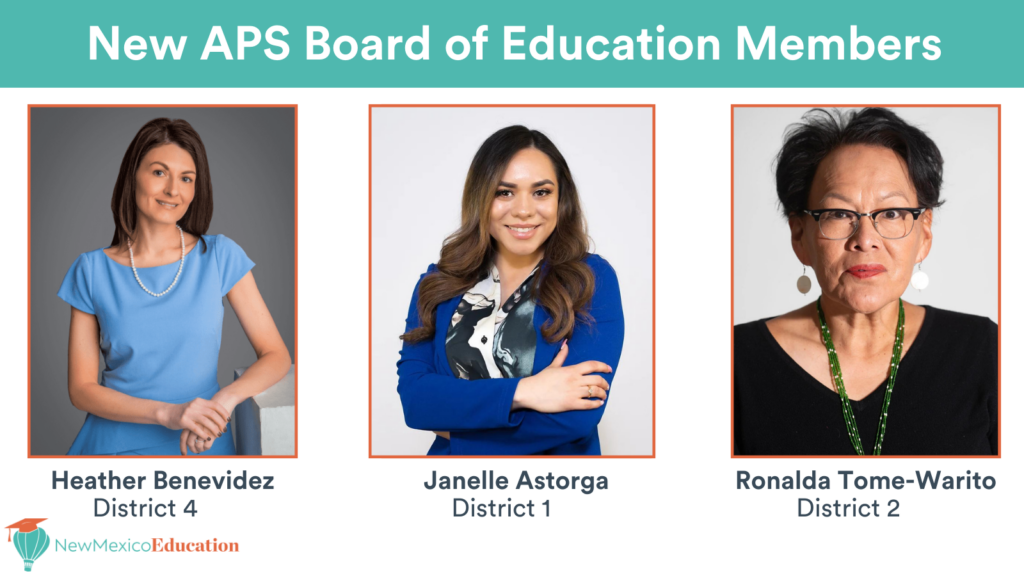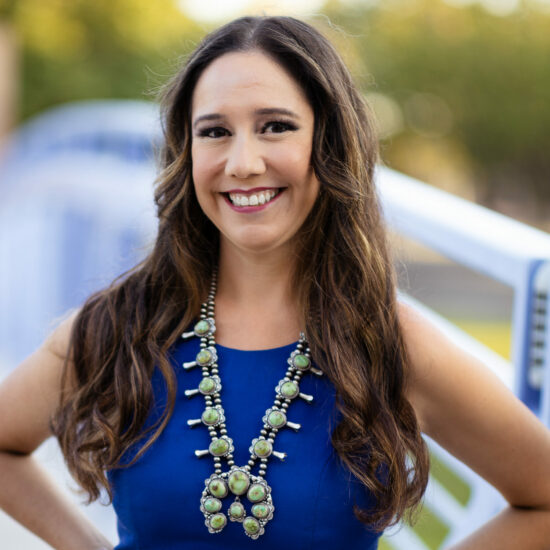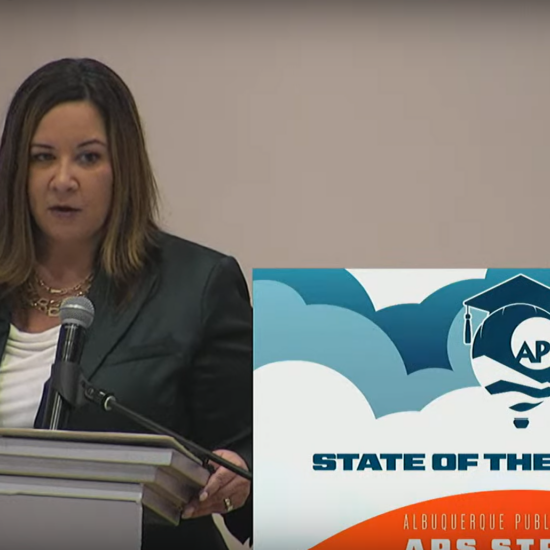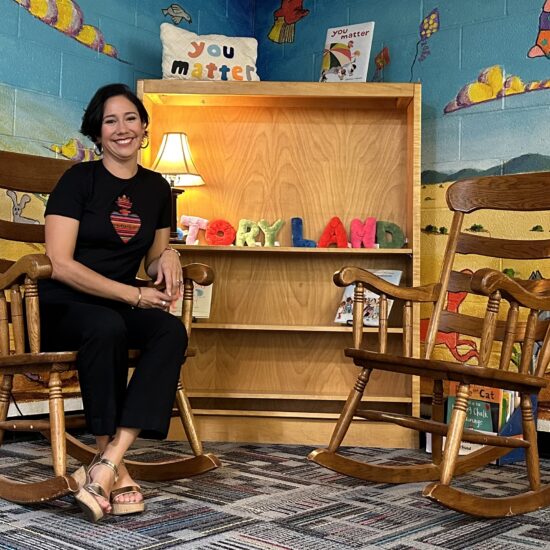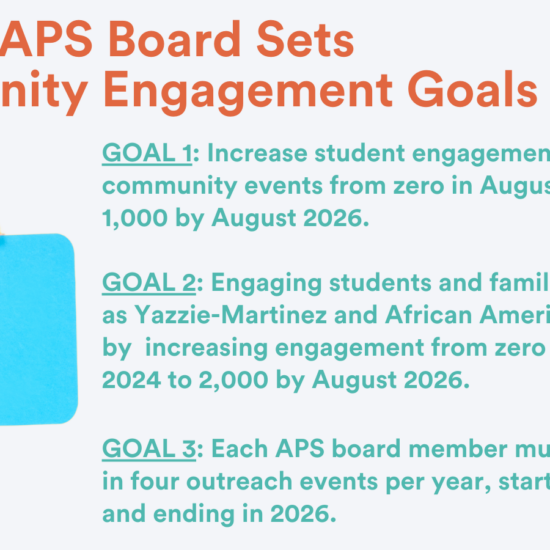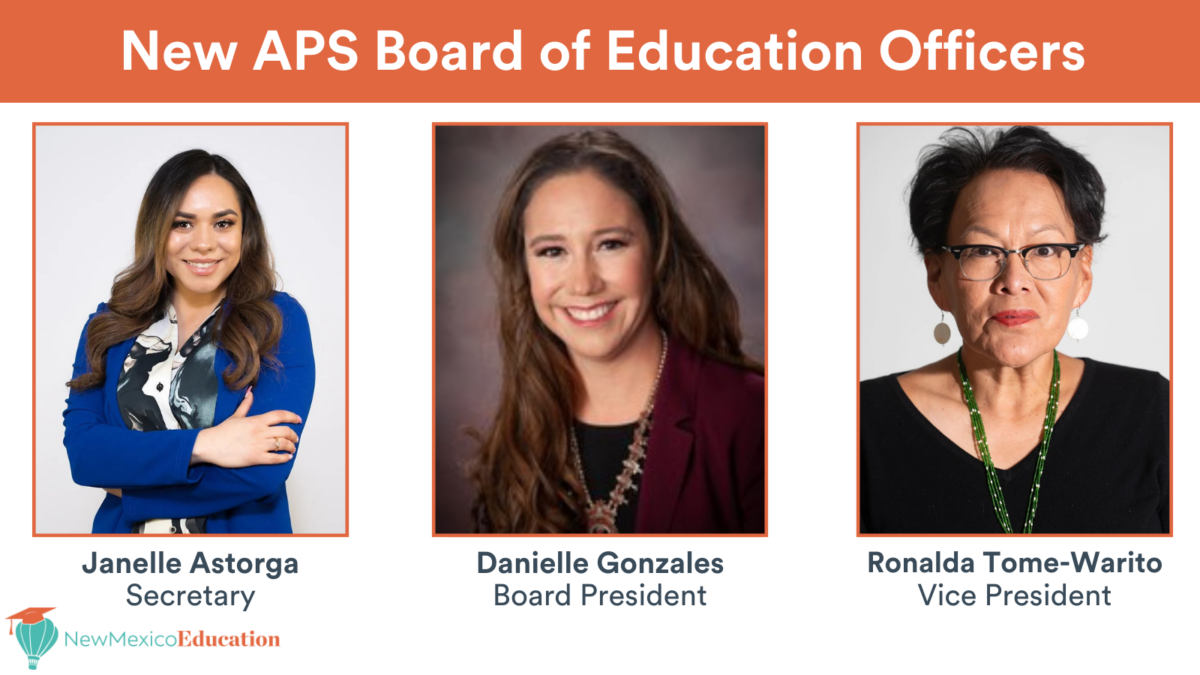
Following the 2023 election, a wave of change has swept over the Albuquerque Public Schools Board of Education, ushering in a new era of leadership and diversity. New members mean new leadership. The board of education elected Danielle Gonzales to the role of board president, freshman member Ronanda Tome-Warito to vice president, and freshman member Janelle Astorga to the role of secretary.
The seven member APS board is moving toward the future, with a number of pressing items on their agenda, like addressing student proficiency and hiring a new superintendent.
New Board Members
Ronalda Tome-Warito – District 2
In a historic moment, Ronalda Tome-Warito, an educational consultant and advocate for children with disabilities and Native American students, was sworn in as the very first Native American school board member in the history of the Albuquerque school board. Tome-Warito said her election to the District 2 seat carries historical significance as she highlighted her great great-grandmother’s experience during the Long Walk of the Navajos in 1863 and the historical exclusion of Native American children within APS.
“I hope within the time in my term that we not only get to see a different lens of what it means to represent our children, all children, especially those of color, who have not only felt the traumas of what the schools have done, but I hope that with this new incoming [board] bringing another lens that we start to heal, and that we start to recognize that we all have a responsibility,” Tome-Warito emphasized during her swearing-in ceremony.
Janelle Astorga – District 1
Janelle Astorga, co-director of Learning Alliance of New Mexico, is the youngest person on the board and leaned into that as a personal strength for the office. She was elected to the District 1 seat.
“To my community, this is only the start,” Astorga said. “We know that there are some things that we want to change, some things that we want to keep and support, and I hope that I am that voice that you all voted me in to be and that I make you all proud.” She went on to say that she intends to advocate for equity and racial justice while on the board.
Heather Benevidez – District 4
Heather Benevidez, leader of a disability advocacy non-profit and a former magistrate judge, took her oath for the District 4 seat.
Benevidez said she is committed to representing the community with integrity and transparency, and she acknowledged the importance of public education while addressing critics who often highlight its flaws.
“I am committed to representing you with integrity, transparency, and a deep sense of responsibility,” she said. “And as we embark on this journey together, please remember the ideals that bind us, the principles of justice, equality, inclusion, diversity, and the importance of public education because they define the very essence of our democracy.” During her speech, Benevidez thanked members of the Albuquerque Teachers Federation for their support and said, “I look forward to working alongside each of my fellow board members to demonstrate the excellence of APS and prove those pessimistic people wrong.”
New Leadership
Each year the APS board structures its government, choosing who will serve in executive roles. Board members were given the opportunity to share which positions they were interested in at the beginning of the meeting. Later, the board accepted formal nominations and voted for each role.
Board President
Two members of the board were nominated for board president, Danielle Gonzales and Josefina Dominguez.
Gonzales spoke about her extensive experience. She stressed her involvement in crafting the goals and guardrails in the APS Emerging Better Plan. Gonzales said, “I have spent my entire career in education, in education policy, specifically.” Her career began as a teacher on the U.S.-Mexico border, where she worked to empower English learners and Mexican nationals. Gonzales spoke about her commitment to student-focused outcomes, saying she would place focus on the importance of selecting a superintendent who shares her vision of improving student outcomes.
Josefina Dominguez was also nominated for the role of president. . “My personal history and the lived experience of my mixed family and my unique experience as an English language learner qualify me,” she said. Dominguez argued that meaningful progress in student outcomes hinges on changing adult behaviors, an insight she said was honed through a year of focusing on student outcomes training. She had argued that her experience as an English Language Learner gave her a unique insight into the challenges faced by bilingual students. During the public forum section of the meeting, members of the Albuquerque carpenters union thanked Dominguez for her support of labor and asked the board to elect a “labor-friendly” president.
Dominguez nominated herself for candidacy, this required the board to confirm that self-nominations were acceptable. Board Member Courtney Jackson then nominated Gonzales for candidacy.
In a 4-3 vote, Gonzales was elected as the new president of the Board of Education.
Astorga, Jackson, and Tapia Romero voted for Gonzales, who voted for herself.
Vice President
The election for the vice president brought two candidates to the front, Crystal Tapia Romero and Tome-Warito.
Tapia cited her experience serving on the Early Learning Advisory Council, appointed by Governor Michelle Lujan Grisham. “I feel confident I can keep the momentum and continue doing what is best for our students,” she said.
Tome-Warito argued her 26-year history of advocating for children with disabilities and Native American students, and her understanding of these challenges, qualified her for the role. “My expertise is not one to go lightly. I have been an advocate for our native American children and children with disabilities for 26 years. I understand the outsides and insides of a successful educational program. I am very aware of the deficiencies of what is occurring within this district, and I also know that we need to work together but it’s going to take expertise.”
Tapia was nominated by Jackson, Tome-Warito was nominated by Dominguez.
Tome-Warito emerged victorious, securing the role of vice president in a 4-3 vote.
Astorga, Benevidez, and Dominguez voted for Tome-Warito who voted for herself.
Secretary
New board members Janelle Astorga and Heather Benevidez expressed their interest in serving as secretary. Astorga stressed her experience as a student and eagerness to bring fresh perspectives to the role, saying that she has a desire to serve the APS community. Astorga said that her age is a tool that can be used on the executive committee, allowing her to better understand the struggles of students at APS today.
Benevidez, drawing from her extensive insights as a parent for almost 21 years and her past role as a municipal and magistrate judge, expressed her motivation for seeking the role, highlighting her organizational skills and her experience as a judge.
Astorga and Benevidez nominated themselves for the role.
Astorga was elected to the position of secretary in a 4-3 vote.
Gonzales, Tapia Romero, and Jackson voted for Astora, who voted for herself.
Committee Chairs
APS has three standing committees which are chaired by members of the board: finance, policy, and audit. Committee chairs have the responsibility of setting agendas and directing committees to complete their work. Gonzales explained that the board must hold an election for the finance and policy chairs, but APS rules state the vice president shall serve as the chair of the audit committee.
Policy Chair
Dominguez nominated herself, and Gonzales nominated Board Member Courtney Jackson to the position of policy committee chair.
Dominguez expressed her eagerness to lead the Policy Committee. She emphasized the importance of cultural and linguistic awareness in policy development, stressing the need to honor heritage, language, and culture while striving for student proficiency. On the discussion of student proficiency, Dominguez said she “has a particular interest and concern about” Goal 1 and 2 in the APS Emerging Better Strategic Plan. Both goals seek to improve student proficiency in English Language Arts and mathematics by 10 percent by 2028. “We will get our kids proficient only after we honor [their] heritage, language and culture,” she said, arguing that it takes 12 years to become proficient at language.
Jackson said the chair’s primary responsibility is to work through policy structure and statements, rather than dictating specific policy recommendations. Jackson said she understands the nuances of policy development and administration, and argued that her experience with Robert’s Rules of Order make her qualified for the role.
Dominguez was nominated by Benevidez, Jackson was nominated by Tapia Romero.
Dominguez was elected to the policy chair position in a 4-3 vote.
Astorga, Tome-Warito, and Benevidez voted for Dominguez, who voted for herself.
Finance Chair
Board Member Crystal Tapia Romero was nominated to be finance committee chair. Tapia Romero was nominated by Jackson and was elected unanimously as she was the only nominee for finance committee chair.
The Future of APS
At the conclusion of the meeting, Gonzales thanked the community for their interest in the APS Board of Education. She then spoke about the future of APS. She said the board is in the process of selecting the next superintendent, and will be working to achieve goals laid out in the Emerging Better Strategic Plan.
Gonzales said that APS is “working really intently to ensure that we’re building safe, equitable learning environments and focusing on school climate for our students.” She also said that the future of APS needs to listen more to students, saying that she would like to have a student serve in some capacity on the board of education.
“The biggest decision that we’re going to make as a new board is going to be selecting our next superintendent,” Gonzales said. “I am committed to staying focused on student outcomes, to choosing a leader who is focused on student outcomes, and then to supporting that leader and evaluating that leader to make sure we’re working collectively to improve student outcomes.”
